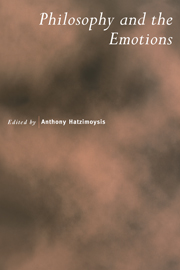Book contents
- Frontmatter
- Contents
- Preface
- Notes on Contributors
- I Emotions, Thoughts and Feelings: What is a ‘Cognitive Theory’ of the Emotions and Does it Neglect Affectivity?
- II The Emotions and their Philosophy of Mind
- III Basic Emotions, Complex Emotions, Machiavellian Emotions
- IV Emotion, Psychosemantics, and Embodied Appraisals
- V Emotions and the Problem of Other Minds
- VI Emotional Feelings and Intentionalism
- VII Emotions, Rationality, and Mind/Body
- VIII The significance of recalcitrant emotion (or, anti-quasijudgmentalism)
- IX The Logic of Emotions
- X Emotion and Desire in Self-Deception
- XI Emotion, Weakness of Will, and the Normative Conception of Agency
- XII Narrative and Perspective; Values and Appropriate Emotions
- XIII Passion and Politics
- XIV Don't Worry, Feel Guilty
- Index
III - Basic Emotions, Complex Emotions, Machiavellian Emotions
Published online by Cambridge University Press: 06 January 2010
- Frontmatter
- Contents
- Preface
- Notes on Contributors
- I Emotions, Thoughts and Feelings: What is a ‘Cognitive Theory’ of the Emotions and Does it Neglect Affectivity?
- II The Emotions and their Philosophy of Mind
- III Basic Emotions, Complex Emotions, Machiavellian Emotions
- IV Emotion, Psychosemantics, and Embodied Appraisals
- V Emotions and the Problem of Other Minds
- VI Emotional Feelings and Intentionalism
- VII Emotions, Rationality, and Mind/Body
- VIII The significance of recalcitrant emotion (or, anti-quasijudgmentalism)
- IX The Logic of Emotions
- X Emotion and Desire in Self-Deception
- XI Emotion, Weakness of Will, and the Normative Conception of Agency
- XII Narrative and Perspective; Values and Appropriate Emotions
- XIII Passion and Politics
- XIV Don't Worry, Feel Guilty
- Index
Summary
Emotion Episodes
According to the distinguished philosopher Richard Wollheim, an emotion is an extended mental episode that originates when events in the world frustrate or satisfy a pre-existing desire (Wollheim, 1999). This leads the subject to form an attitude to the world which colours their future experience, leading them to attend to one aspect of things rather than another, and to view the things they attend to in one light rather than another. The idea that emotions arise from the satisfaction or frustration of desires—the ‘match-mismatch’ view of emotion aetiology—has had several earlier incarnations in the psychology of emotion. Early versions of this proposal were associated with the attempt to replace the typology of emotion found in ordinary language with a simpler theory of drives and to define new emotion types in terms of general properties such as the frustration of a drive. The match-mismatch view survived the demise of that revisionist project and is found today in theories that accept a folk-psychological-style taxonomy of emotion types based on the meaning ascribed by the subject to the stimulus situation. For example, the match-mismatch view forms part of the subtle and complex model of emotion episodes developed over many years by Nico Frijda (Frijda, 1986). According to Frijda, information about the ‘situational antecedents’ of an emotion—the stimulus in its context, including the ongoing goals of the organism—is evaluated for its relevance to the multiple concerns of the organism. Evaluation of match-mismatch—the degree of compatibility between the situation and the subject's goals—forms part of this process.
- Type
- Chapter
- Information
- Philosophy and the Emotions , pp. 39 - 68Publisher: Cambridge University PressPrint publication year: 2003
- 22
- Cited by



